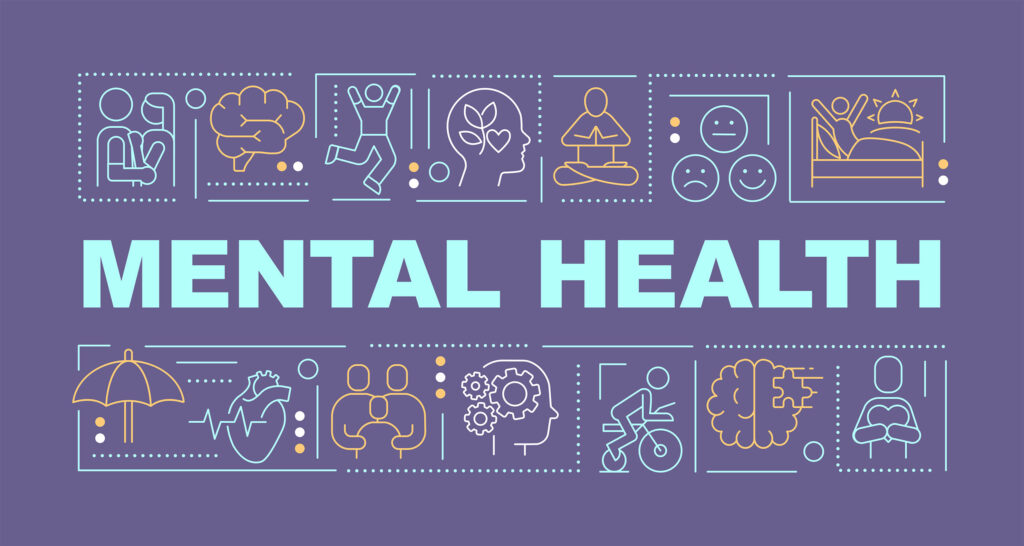The Value of Mental Health: a Deep Study Counseling, Treatment, and Their Advantages
Psychological health and wellness considerably forms individual well-being, impacting thoughts, behaviors, and emotions. Counseling and therapy work as essential opportunities for healing and individual advancement. They provide structured assistance, aiding people browse life's challenges. Yet, lots of continue to be uninformed of the certain sorts of therapy readily available and their unique benefits. Comprehending these facets is essential for any individual thinking about professional psychological health support. What complies with might light up courses to durability and fulfillment that numerous ignore.
Comprehending Mental Health and Its Effect
Although psychological health is often neglected, it plays an essential role in total health and daily performance. It includes psychological, psychological, and social elements that affect just how people assume, really feel, and behave. An individual's mental health and wellness straight impacts their capability to deal with stress and anxiety, connect to others, and choose. Poor mental health can bring about various issues, consisting of anxiety, depression, and trouble in maintaining relationships, all of which can impede expert and individual growth.Furthermore, mental health has significant ramifications for physical health. Persistent anxiety and unattended psychological problems can add to various physical ailments, such as heart problem and deteriorated immune responses. Alternatively, favorable mental health promotes strength, enabling people to deal with life's challenges successfully. Comprehending mental health's value is vital for fostering helpful settings that promote psychological wellness, thereby improving the lifestyle for areas and people alike
The Various Kinds of Counseling and Treatment
In the domain of psychological wellness, numerous counseling and therapy kinds satisfy varied needs. Private counseling techniques concentrate on individual issues through individually sessions, while team therapy characteristics foster shared experiences and assistance among individuals. Understanding these techniques is vital for selecting the appropriate treatment for different challenges.
Individual Therapy Approaches
Many specific therapy techniques exist, each created to resolve details mental health and wellness issues and satisfy varying customer needs. Cognitive Behavior Modification (CBT) concentrates on identifying and transforming negative idea patterns, while Psychodynamic Therapy discovers subconscious processes and past experiences. Humanistic Treatment highlights personal growth and self-actualization, cultivating an encouraging setting. Interpersonal Treatment (IPT) targets relationship concerns and communication patterns to enhance emotional wellness. In addition, Approval and Commitment Therapy (ACT) motivates customers to accept their thoughts and sensations while dedicating to personal worths. Each strategy offers distinct techniques and philosophies, enabling professionals to customize their approaches to the person, thus improving the healing experience and promoting mental health and wellness recuperation.
Group Treatment Dynamics
Team treatment dynamics encompass various healing strategies that utilize the power of interpersonal relationships and common experiences. This kind of therapy usually includes varied teams, promoting a secure atmosphere for individuals to share ideas and sensations. Trick sorts of team therapy consist of assistance groups, which offer psychological assistance; process-oriented groups, focusing on interpersonal interactions; and psychoeducational teams, focused on imparting expertise about psychological health and wellness concerns. The characteristics within these teams can enhance self-awareness, as members often mirror on their behaviors in connection with others. In addition, team therapy cultivates a feeling of belonging, reducing sensations of isolation. Through shared stories and collective analytic, participants can create coping methods and gain insights, ultimately adding to individual growth and recovery.
The Duty of Therapy in Mental Health And Wellness
Therapy plays an important role in mental health and wellness by using different strategies tailored to specific needs. These techniques provide specialist advice that can result in significant improvements in psychological well-being. Understanding the various kinds of therapy can help individuals make educated choices about their psychological healthcare.

Sorts Of Therapy Approaches
While various therapy strategies exist, each deals special methodologies and insights into psychological health and wellness therapy - Mental Health Resources. Amongst one of the most famous are cognitive-behavioral treatment (CBT), which concentrates on altering adverse thought patterns; psychodynamic treatment, which checks out unconscious procedures and childhood years experiences; and humanistic strategies, stressing individual development and self-actualization. In addition, solution-focused short treatment prioritizes locating options in the existing as opposed to delving into troubles. Group treatment fosters community and shared experiences, while family members therapy addresses relational characteristics within domestic frameworks. Each approach deals with different demands, straightening with specific choices, issues, and restorative objectives. Recognizing these strategies helps clients make informed choices concerning their mental wellness journey and promotes reliable therapy tailored to their unique conditions
Advantages of Expert Support
Various people profit from professional guidance in managing their mental health obstacles. Counseling uses a risk-free room for customers to discover their ideas and feelings without judgment. This restorative setting promotes self-awareness, permitting people to identify patterns in their habits and develop much healthier coping techniques. Expert assistance also offers access to evidence-based methods that can minimize symptoms of stress and anxiety, depression, and other mental wellness concerns. In addition, therapists can aid in establishing sensible objectives and offer support in attaining them, boosting total well-being. The collaborative partnership between counselor and client is necessary, as it advertises liability and urges individual development. Inevitably, professional guidance plays a crucial duty in guiding psychological health and wellness journeys, resulting in improved emotional resilience and life satisfaction.
Advantages of Treatment: Recovery and Development

Exactly how to Choose the Right Therapist or Counselor
How can one navigate the commonly frustrating procedure of choosing the appropriate specialist or counselor? Determining individual requirements is crucial; people need to consider their particular issues, whether clinical depression, anxiety, or partnership difficulties. It is beneficial to study different therapeutic approaches, such as cognitive-behavioral treatment or psychodynamic treatment, to discover a suitable match.Next, potential customers must seek references from trusted resources or use online directories. It is crucial to assess specialists' credentials, including their education and learning, licensing, and areas of expertise. Scheduling first appointments can assist determine compatibility, enabling individuals to evaluate communication styles and personal comfort.Finally, logistical aspects, such as location, accessibility, and charges, ought to also my sources be taken into consideration. By thoughtfully evaluating these aspects, one can make an informed decision, inevitably promoting a therapeutic connection that supports mental health and personal development.
Getting Over Preconception: Accepting Mental Wellness Assistance
While social mindsets toward mental health and wellness have actually evolved, stigma still presents a considerable barrier for numerous seeking assistance. This preconception frequently shows up as false impressions surrounding mental disease, leading individuals to feel pity or worry concerning their battles. Lots of people wait to seek therapy or treatment as a result of stress over being judged or classified. Conquering this stigma is fundamental for fostering an encouraging environment where individuals can honestly discuss their mental health and wellness needs.Communities and companies play an important role in this makeover by promoting awareness and education and learning regarding mental health and wellness concerns. Initiatives that highlight individual stories can humanize these experiences, urging others to look for assistance without worry. As approval expands, individuals might really feel a lot more empowered to welcome psychological health and wellness support, acknowledging it as an important facet of total wellness. By taking apart preconception, society can cultivate a society of understanding, compassion, and positive psychological healthcare.
Techniques for Maintaining Mental Health Outside of Treatment
Treatment provides important support, keeping mental wellness outside of sessions is equally vital. Individuals can implement a number of techniques to sustain their mental health. Regular physical task plays an essential function, as exercise promotes the release of endorphins, which enhance mood. In addition, a balanced diet plan rich in nutrients can substantially impact emotional security and energy levels.Practicing mindfulness and meditation aids individuals manage stress and anxiety and establish greater self-awareness. Establishing a regular rest routine is also fundamental, as top quality remainder is vital for cognitive feature and psychological regulation.Engaging in social tasks promotes link and minimizes feelings of seclusion. Going after hobbies or interests can give a creative electrical outlet and increase self-worth. Finally, establishing practical goals and practicing self-compassion permits individuals to cultivate strength. By integrating these approaches into day-to-day life, individuals can successfully support their mental wellness beyond treatment sessions.
Regularly Asked Questions

Just How Can I Tell if I Required Treatment?

Figuring out the demand for therapy usually entails recognizing relentless feelings of unhappiness, anxiety, or frustrating stress. If day-to-day operating ends up being challenging or coping systems fall short, looking for specialist assistance might be a beneficial action onward.
What Should I Expect in My Initial Therapy Session?
In the first treatment session, individuals can anticipate an introduction, conversation of their factors for seeking aid, and a review of the specialist's technique, developing a structure for future conversations and establishing convenience in the restorative room.
Are Online Treatment Sessions as Effective as In-Person Ones?
Study shows that online therapy sessions check here can be as effective as in-person ones. Variables such as the therapist's credentials, customer involvement, and the healing relationship greatly influence end results, no matter of the tool used.
Can Therapy Aid With Partnership Concerns?
Therapy can help people in attending to relationship problems by giving devices for interaction, comprehending emotions, and fixing problems. Marriage Counselling. It advertises much healthier dynamics and motivates individual growth, eventually fostering stronger, more satisfying connections between partners
How Much Time Does Treatment Commonly Last?
Therapy period differs substantially based on specific requirements and goals. Commonly, sessions might last from a couple of weeks to a number of months, with some people involving in ongoing treatment to address long-lasting issues and personal growth. Cognitive Behavioral Treatment (CBT) concentrates on determining and changing adverse thought patterns, while Psychodynamic Treatment checks out subconscious processes and previous experiences. Secret types of group treatment consist of support teams, which provide psychological support; process-oriented groups, concentrating on social interactions; and psychoeducational teams, intended at giving knowledge regarding mental health and wellness problems. Amongst the most prominent are cognitive-behavioral therapy (CBT), which focuses on altering negative thought patterns; psychodynamic treatment, which explores unconscious processes and childhood experiences; and humanistic techniques, emphasizing individual development and self-actualization. Team treatment fosters community and shared experiences, while family therapy addresses relational characteristics within domestic structures. It is valuable to research study various restorative methods, such as cognitive-behavioral treatment or psychodynamic treatment, to locate an appropriate match.Next, potential clients should look for recommendations from relied on resources or use on-line directory sites.
Comments on “Cognitive Behavioural Therapy: How It Transforms Thought Patterns”